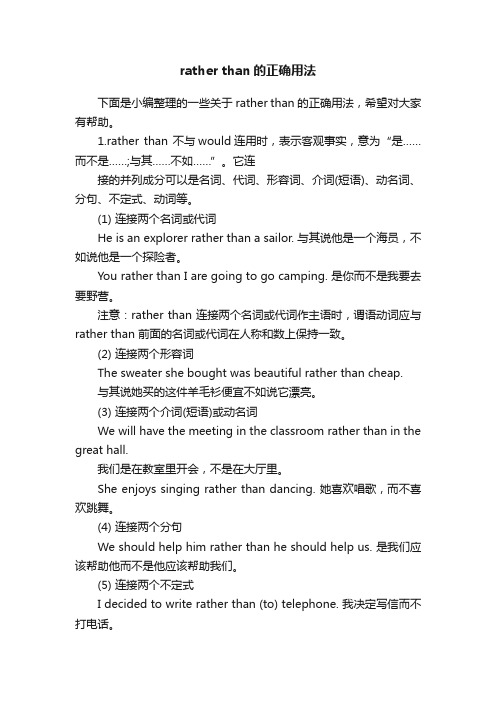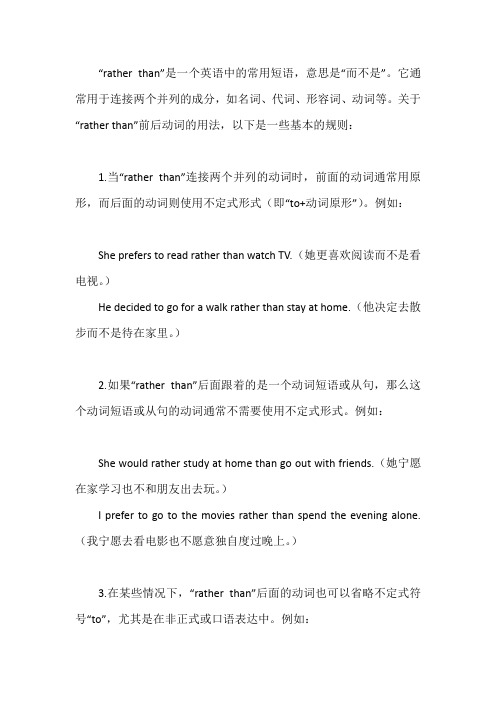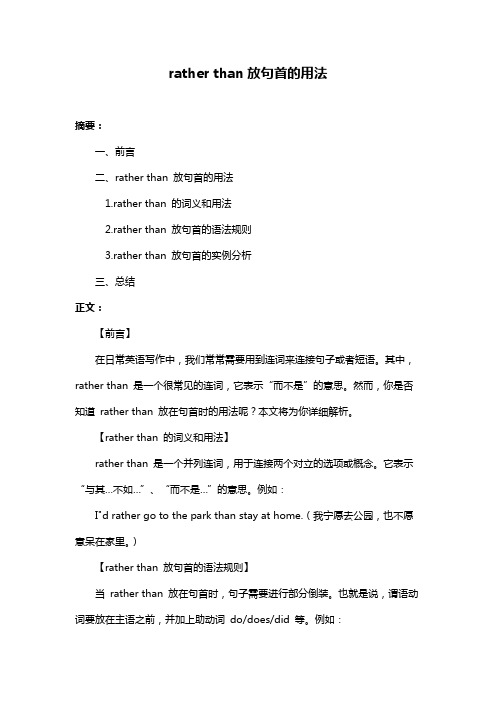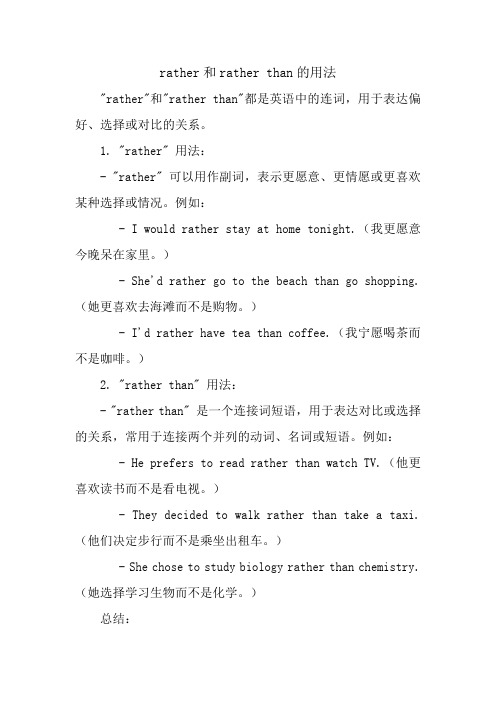英语语法——rather_than用法小结
ratherthan的正确用法

rather than的正确用法下面是小编整理的一些关于rather than的正确用法,希望对大家有帮助。
1.rather than 不与would连用时,表示客观事实,意为“是……而不是……;与其……不如……”。
它连接的并列成分可以是名词、代词、形容词、介词(短语)、动名词、分句、不定式、动词等。
(1) 连接两个名词或代词He is an explorer rather than a sailor. 与其说他是一个海员,不如说他是一个探险者。
You rather than I are going to go camping. 是你而不是我要去要野营。
注意:rather than 连接两个名词或代词作主语时,谓语动词应与rather than 前面的名词或代词在人称和数上保持一致。
(2) 连接两个形容词The sweater she bought was beautiful rather than cheap.与其说她买的这件羊毛衫便宜不如说它漂亮。
(3) 连接两个介词(短语)或动名词We will have the meeting in the classroom rather than in the great hall.我们是在教室里开会,不是在大厅里。
She enjoys singing rather than dancing. 她喜欢唱歌,而不喜欢跳舞。
(4) 连接两个分句We should help him rather than he should help us. 是我们应该帮助他而不是他应该帮助我们。
(5) 连接两个不定式I decided to write rather than (to) telephone. 我决定写信而不打电话。
注意:rather than 后接不定式时,不定式可以带to,也可以不带to, 如上句。
但rather than位于句首时,则只能接不带to 的不定式。
ratherthan的用法说明

rather than的用法说明rather than 意为“而不是”、“而没有”,侧重客观上的差别,还可以表示“与其……,倒不如(或宁可)……”,侧重句子主语或说话人主观上的选择。
句中 rather than 前后一般应为名词、代词、动名词、形容词、谓语动词、动词不定式、介词短语,甚至分句等。
下面小编来为大家介绍下rather than 的用法说明,希望对大家有用。
rather than 的用法说明如下:一、rather than 接名词1. He is an artist rather than a politician.他是位艺术家,而不是政治家。
(与其说他是政治家,倒不如说他是艺术家。
)2. We ought to invest in new machinery rather than building.我们该在新机器上而不是在建筑上投资。
3. What attracted him is her personality rather than her beauty.吸引他的是她的人格魅力,而不是她的美貌。
二、rather than 接代词1. It ought to be me rather than you that sign the letter.在信上签名的该是我,而不是你。
2. The person who should be praised is you rather than me.该受到表扬的人是你,而不是我。
三、rather than 接动名词1. I always prefer getting up early rather than going to school without breakfast.我总是愿意早起床,而不愿不吃早饭就去上学。
2. He enjoys reading rather than watching TV.他喜欢读书而不喜欢看电视。
3. He was engaged in writing rather than reading the newspaper.他在忙着写东西,而不是在看报纸。
rather than前后的动词用法

“rather than”是一个英语中的常用短语,意思是“而不是”。
它通常用于连接两个并列的成分,如名词、代词、形容词、动词等。
关于“rather than”前后动词的用法,以下是一些基本的规则:1.当“rather than”连接两个并列的动词时,前面的动词通常用原形,而后面的动词则使用不定式形式(即“to+动词原形”)。
例如:She prefers to read rather than watch TV.(她更喜欢阅读而不是看电视。
)He decided to go for a walk rather than stay at home.(他决定去散步而不是待在家里。
)2.如果“rather than”后面跟着的是一个动词短语或从句,那么这个动词短语或从句的动词通常不需要使用不定式形式。
例如:She would rather study at home than go out with friends.(她宁愿在家学习也不和朋友出去玩。
)I prefer to go to the movies rather than spend the evening alone.(我宁愿去看电影也不愿意独自度过晚上。
)3.在某些情况下,“rather than”后面的动词也可以省略不定式符号“to”,尤其是在非正式或口语表达中。
例如:I'd rather eat an apple than (to) drink a soda.(我宁愿吃苹果也不喝汽水。
)She'd prefer to sleep rather than (to) stay up late.(她宁愿睡觉也不熬夜。
)需要注意的是,“rather than”前后的动词形式可能会受到上下文和语境的影响,因此在实际使用中需要根据具体情况进行判断和调整。
同时,也要注意保持语法和表达的正确性和准确性。
rather...than的用法总结

rather...than的用法总结rather than表示宁可...也不要,rather than的用法有很多,你知道的有多少种呢?下面小编给大家整理了rather than的用法总结,希望大家喜欢!rather than的意思(要) …而不…,与其…倒不如…; instead of sb/sth 而不是;rather than的用法总结11. 用作连词(=but not),意为“而不”“不是……(而是)”“与其……(不如)”,前后连接的成分应该是平行的。
如:He ran rather than walked. 他不是在走而是在跑。
He is a writer rather than a teacher. 与其说他是教师还不如说他是作家。
You are doing this for yourself rather than for others. 你做这件事不是为别人而是为你自己。
It was what he meant rather than what he said. 这是他的意思,而不是他说的话。
2. 由于既可视为连词也可视为介词,所以连接不定式时,后面一个不定式可带to或不带to(视为准并列连词时),也可用动名词(视为介词时)。
如:I decided to stay at home rather than (to) go [going] to the cinema. 我宁愿呆在家里也不愿去看电影。
但是,如果rather than 位于句首,其后的不定式通常不带to(也可用动名词)。
如:Rather than waste [wasting] your time doing it yourself, why don’t you call in a builder? 你为什么宁愿浪费时间自己去干而不去请一个包工的呢?Rather than use [using] the last of my cash, I decided to writea cheque. 我决定开张支票而不把现金用光。
rather than用法小结

rather than用法小结Rather than(而不是)是一个常用的短语,用于表示两个不同的选择或观点之间的比较。
它在口语和书面语中都很常见,在不同的语境中有着不同的用法。
本文将对rather than的几种常见用法进行小结,并给出相应示例。
1. 表示选择Rather than在表示选择时,可以用来表示更倾向于或更喜欢的选择。
下面是一些例子:- 我宁愿待在家里看书,而不是去参加派对。
- I would rather stay at home and read a book, rather than go to the party.- 她更愿意点一杯咖啡,而不是喝茶。
- She would rather order a cup of coffee, rather than have tea.2. 表示转折Rather than也可以用来表示转折的观点或行为。
下面是一些例子:- 我们应该多关注他的长处,而不是批评他的短处。
- We should focus on his strengths, rather than criticize his weaknesses.- 他们应当团结合作,而不是互相指责。
- They should work together, rather than blame each other.3. 表示对比Rather than还可以用来表示对比两个事物之间的不同之处。
下面是一些例子:- 我更喜欢夏天,而不是冬天,因为我不喜欢寒冷的天气。
- I prefer summer rather than winter because I don't like cold weather.- 我们应该注重质量,而不是数量。
- We should focus on quality rather than quantity.4. 表示替代Rather than还可以用来表示替代或取代的意思。
rather than 用法小结通用版

rather than 用法小结通用版Rather than是一个常见的短语,在英语中有多种用法。
它可以用作连词,副词或介词。
在本文中,我们将对rather than的各种用法进行小结和说明。
1. 作为连词在连词的用法中,rather than用于表达对比或选择,表示“而不是”之意。
它连接两个并列的动词、名词短语或从句,并强调第一个选项相对于第二个选项的优势或偏好。
例如:- He likes to play basketball rather than soccer.(他喜欢打篮球而不是踢足球。
)- I would prefer to stay at home tonight rather than go to the party.(今晚我宁愿呆在家里而不是去参加派对。
)- She chose to study literature rather than science in college.(她选择在大学里学文学而不是科学。
)2. 作为副词在副词的用法中,rather than修饰形容词或副词,表示程度上的区别或否定。
例如:- The movie was rather boring.(这部电影相当无聊。
)- I am feeling tired rather than energetic today.(今天我感到疲倦而不是精力充沛。
)- The weather is cold, but not rather than freezing.(天气很冷,但并没有到极冷的程度。
)3. 作为介词在介词的用法中,rather than用于替代instead of或in preference to,表示偏好或选择。
例如:- He would eat pizza rather than pasta.(他宁愿吃比萨饼而不是意大利面。
)- I prefer tea rather than coffee.(我更喜欢茶而不是咖啡。
rather_than用法小结(大全)

rather_than用法小结(大全)第一篇:rather_than用法小结(大全)rather than 用法小结rather than 是一个并列连词,用法比较复杂,现归纳如下:1.rather than 与would 连用时,构成“would rather...than...”句式,意思是“宁愿……而不愿……”,表示主观愿望,即在两者之中选择其一。
例如:She'd rather die than lose the children.她宁愿死也不愿失去孩子们。
2.rather than 不与would连用时,表示客观事实,意为“是……而不是……;与其……不如……”。
它连接的并列成分可以是名词、代词、形容词、介词(短语)、动名词、分句、不定式、动词等。
现分述如下:(1)连接两个名词或代词He is an explorer rather than a sailor.与其说他是一个海员,不如说他是一个探险者。
You rather than I are going to go camping.是你而不是我要去要野营。
注意:rather than 连接两个名词或代词作主语时,谓语动词应与rather than 前面的名词或代词在人称和数上保持一致。
(2)连接两个形容词The sweater she bought was beautiful rather than cheap.与其说她买的这件羊毛衫便宜不如说它漂亮。
(3)连接两个介词(短语)或动名词We will have the meeting in the classroom rather than in the great hall.我们是在教室里开会,不是在大厅里。
She enjoys singing rather than dancing.她喜欢唱歌,而不喜欢跳舞。
(4)连接两个分句We should help him rather than he should help us.是我们应该帮助他而不是他应该帮助我们。
rather than 的用法通用版

rather than 的用法通用版Rather Than的用法通用版Rather than是一个常用的短语,可以用于表示选择或偏爱。
在句子中,rather than用来比较两个事物或行为,并强调选择其中一个。
1. Rather than + 动词原形在句子中,rather than可与动词原形连用。
它表示偏爱或选择一种行为而不是另一种。
例如:- 我宁愿去看电影而不是去购物。
I would rather watch a movie than go shopping.- 他们宁愿选择在海滩上晒太阳,而不是在室内工作。
They would rather sunbathe on the beach than work indoors.2. Rather than + 名词rather than也可用来连接两个名词短语,表示对其中一个的选择或偏爱。
例如:- 我们应该重视学习而不是游戏。
We should focus on study rather than games.- 她更喜欢蓝色而不是红色。
She prefers blue rather than red.3. Rather than + 名词从句rather than也可以连接两个名词从句,用来表示选择或偏爱某一种条件或情况。
例如:- 他们宁愿接受困难的挑战,而不是保持平安无事。
They would rather face difficult challenges than remain safe and sound.- 这个国家更愿意发展绿色能源而不是依赖化石燃料。
The country would rather develop green energy than rely on fossil fuels.4. Rather than的替代结构除了rather than,我们还可以使用instead of来表示“而不是”的意思。
这两个短语在用法上基本相同。
rather than用法总结

rather than用法总结前言在英语中,我们经常会用到”rather than”这个短语,来表达对比或者选择的关系。
它在句子中充当连词,并且有特定的用法和语法结构。
本文将总结”rather than”的用法,帮助大家正确运用这个短语。
正文1. “rather than”的基本用法•“rather than”是一个固定的短语,表示偏向或选择,用于进行对比或者选择。
•它可以连接两个并列的动词、形容词、名词、副词,或者连接两个从句。
2. 连接动词•“rather than”连接两个并列的动词,表示选择其中一个,而不选择另一个。
•例如:I would rather read a book than watch TV.(我宁愿看书而不愿看电视。
)3. 连接形容词•“rather than”连接两个并列的形容词,表示选择其中一个,而不选择另一个。
•例如:She is kind rather than cruel.(她更善良而不是残忍。
)4. 连接名词•“rather than”连接两个并列的名词,表示选择其中一个,而不选择另一个。
•例如:I prefer apples rather than oranges.(我更喜欢苹果而不是橙子。
)5. 连接副词•“rather than”连接两个并列的副词,表示选择其中一个,而不选择另一个。
•例如:He runs rather than walks.(他跑步而不是走路。
)6. 连接从句•“rather than”连接两个并列的从句,表示选择其中一个,而不选择另一个。
•例如:She would rather stay at home than go out.(她宁愿呆在家里而不愿出去。
)结尾通过本文的总结,我们了解了”rather than”的基本用法。
它可以用于连接动词、形容词、名词、副词和从句,并且表示偏向或选择的关系。
希望这份总结能够帮助大家更好地运用”rather than”这个短语。
rather than的用法与搭配

rather than的用法与搭配
than是一个连接副词,用来连接并列的成分。
在句中用于进行比较、对比或权衡等比较性的表达时最为常见。
一、rather than的用法
1. rather than作为连词,用来表示转折,意思是“而不是”。
常用句型为:主语+rather than+动词宾语/不定式/从句。
例句:
She chose to read books rather than watch television.
她选择读书而不是看电视。
2. rather than另一常见用法是放于句首,表达强调的意思,相当于and not。
例句:
Rather than staying at home, I prefer to go out to see some friends.
我宁愿出去见几个朋友,而不愿意呆在家里。
二、rather than的搭配
常见的搭配有:
1. do something rather than do something else
选择做某事而不做另一件事
例句:
I would rather buy a new dress rather than repair the old one. 我宁愿买一件新衣服,而不愿修补旧衣服。
2. choose to do something rather than doing something else 选择做某事而不做另一件事
例句:
He chose to study medicine rather than engineering. 他选择学医学而不是学工程学。
rather than 用法小结

rather than 用法小结Rather than用法小结在英语中,我们经常使用rather than这个短语来表示“与其……不如……”,用于对比两个或多个不同选择或情况。
在本篇文章中,我们将就rather than的用法进行小结,并提供实际例句以帮助读者更好地理解和运用。
1. 介词短语用法当rather than作为介词短语使用时,它通常放在句中两个并列的动词之间,用于表示选择或偏好。
它的位置可以灵活调整,但要保持语法上的正确性。
以下是一些例句:- I would rather stay at home than go out tonight.(与其今晚出去,我宁愿呆在家里。
)- He prefers to read rather than watch TV.(与其看电视,他更喜欢读书。
)- She decided to save money rather than spend it all.(她决定把钱存起来,而不是全部花掉。
)2. 动词不定式用法rather than还可以与动词不定式连用,形成"to do rather than to do"的结构,在表示选择或偏好时使用。
该结构中的两个不定式需保持对称性,即用to do两次。
以下是一些例句:- I decided to stay home rather than to go to the party.(与其去参加派对,我选择呆在家里。
)- She prefers to study rather than to play video games.(她宁愿学习而不是玩电子游戏。
)- The company chose to invest in research and development rather thanto focus on immediate profits.(公司选择将投资用于研发,而不是专注于即时利润。
rather... than的用法

rather... than的用法rather than:意为“是……而不是……;与其……不如……”1.rather than 可以作连词(conjunction),就是连接两个句子时将两个句子中的相同部分省略掉。
例如:I read a book. / I lisen to music.用rather than 连接:I read a book rather than listen to music.当两个句子包含相同的主语和谓语动词的时候,用rather than连接就省略主语和动词:例如:I drink coffee rather than (I drink) tea.2.rather than 作介词preposition:Rather than driving, he rode his bike to work.she took the blame rather than blaming everyone else.注意:当rather than 做连词,可以分开使用,因为rather 是副词,than 是连词,所以 rather 可以放在前面:I'd rather prefer to play basketball than fooball.但rather than 作介词,是个整体,不能分开使用:Rather than driving, he rode his bike to work.3..如果在两者中进行取舍,表示“宁愿……而不愿……,与其……宁可……”的意思时,则可用would rather…than…或would…rather than…的句型。
I would rather read book at home than go to the library.The children would play games rather than read books.。
ratherthan的用法

ratherthan的用法在英语中,rather than的用法是比较常见的,它通常表示两个事物之间的选择关系。
下面,我将分步骤阐述rather than的用法。
一、rather than的含义在英语中,rather than通常表示“而不是”的含义。
它用来比较两个事物之间的选择关系。
例如,我们可以说:“我喜欢看电影,而不是看电视剧。
”这句话中,rather than就表示了两者之间的选择关系。
二、rather than的语法比较两个事物之间的选择关系时,我们可以使用“主语+动词+rather than+另一个动词”的结构。
例如,我们可以说:“他更喜欢看足球比赛,而不是打篮球。
”这句话中,“他更喜欢看足球比赛”就是主语+动词,“打篮球”就是另一个动词。
此外,我们还可以使用“从句+rather than+另一个从句”的结构。
例如,我们可以说:“他宁愿坐在家里看电视,也不愿意出去玩。
”这句话中,“他宁愿坐在家里看电视”就是一个从句,“出去玩”就是另一个从句。
三、rather than的用法注意事项1. rather than通常用于比较两个事物之间的选择关系,因此我们应该使用适当的词语来表达这种比较关系,例如“更喜欢”、“宁愿”等。
2. rather than连接的两个动词应该是同一种类的动词,例如都是不及物动词、都是及物动词等。
3. rather than后面的从句应该和前面的从句在词性、语态、时态等方面保持一致。
4. rather than可以被用于否定句、反问句和条件句中。
四、rather than的例句1. I prefer reading books rather than watching TV.我更喜欢读书,而不是看电视。
2. He would rather stay at home than go out for a walk.他宁愿待在家里,也不愿意出去散步。
3. She would rather not come to the party, but she has to.她本不想来参加派对,但她不得不来。
rather than的用法_用法辨析 英语语法.doc

rather than的用法_用法辨析一、rather than用作连词,连接两个平行结构。
既可以表示主观愿望上的决择,与其宁可,也可以表示客观程度上的差异,与其说是不如说是。
例如:1、接代词1)I,rather than you,should do the work.该做这工作的是我,而不是你。
2、接名词2)John ought to go rather than Jean.约翰比琴更应该去。
3)I think I’ll have a cold drink rather than coffee.我想我该要一杯冷饮,而不要咖啡。
试比较:4)We sometimes eat rice instead of potatoes.有时候我们不吃土豆,而吃米饭。
3、接形容词5)These shoes are comfortable rather than good-looking.这鞋不好看可是舒服。
6)You are doing this for yourself rather than for your friend.你不是为你朋友,而是为你自己做这种事。
7)I’d prefer to go in August rather than in July.我愿8月去不愿7月去。
5、接动名词8)I always prefer starting early,rather than leaving everything to the last minute.我总是愿意早开始而不愿意把所有事情都留到最后才做。
9)He was engaged in writing a letter rather than reading the newspaper.他那时是在写信而不是看报纸。
6、接过去分词10)She insisted on having the room papered rather than painted.她坚持要用纸裱糊房间,而不是把房间粉刷一下。
英语句型rather_than的用法

英语句型r a t h e r_t h a n的用法(总4页)--本页仅作为文档封面,使用时请直接删除即可----内页可以根据需求调整合适字体及大小--rathe r than 是一个并列连词,用法比较复杂,现归纳如下:1. ra ther than 与w ou ld连用时,构成“wo u ld r ath e r...t h an...”句式,意思是“宁愿……而不愿……”,表示主观愿望,即在两者之中选择其一。
例如:She'd rather die th an l os e th e ch il dr en. 她宁愿死也不愿失去孩子们。
2. ra ther than 不与would连用时,表示客观事实,意为“是……而不是……;与其……不如……”。
它连接的并列成分可以是名词、代词、形容词、介词(短语)、动名词、分句、不定式、动词等。
现分述如下:(1) 连接两个名词或代词He is an explorer r at he r t h an a s ai lo r.与其说他是一个海员,不如说他是一个探险者。
You r ather than I a re g oi n g t o go c am pi ng. 是你而不是我要去要野营。
注意:rather than 连接两个名词或代词作主语时,谓语动词应与rat her than前面的名词或代词在人称和数上保持一致。
(2) 连接两个形容词The s weater she bou gh t wa s be au ti fu l ra th er t ha n c h e a p. 与其说她买的这件羊毛衫便宜不如说它漂亮。
(3) 连接两个介词(短语)或动名词We wi ll have the me et in g i n t he c la ss ro om r at he r t h a n in the gre a t ha ll.我们是在教室里开会,不是在大厅里。
rather than放句首的用法

rather than放句首的用法摘要:一、前言二、rather than 放句首的用法1.rather than 的词义和用法2.rather than 放句首的语法规则3.rather than 放句首的实例分析三、总结正文:【前言】在日常英语写作中,我们常常需要用到连词来连接句子或者短语。
其中,rather than 是一个很常见的连词,它表示“而不是”的意思。
然而,你是否知道rather than 放在句首时的用法呢?本文将为你详细解析。
【rather than 的词义和用法】rather than 是一个并列连词,用于连接两个对立的选项或概念。
它表示“与其…不如…”、“而不是…”的意思。
例如:I"d rather go to the park than stay at home.(我宁愿去公园,也不愿意呆在家里。
)【rather than 放句首的语法规则】当rather than 放在句首时,句子需要进行部分倒装。
也就是说,谓语动词要放在主语之前,并加上助动词do/does/did 等。
例如:Rather than go to the party, she stayed home.(她选择待在家里,而不是去参加派对。
)【rather than 放句首的实例分析】以下是一些rather than 放句首的实例:1.Rather than watch a movie, he preferred to read a book.(他宁愿看书,也不愿意看电影。
)在这个例子中,谓语动词是“preferred”,放在主语“he”之前,并加上助动词“did”。
2.Rather than eat out, we decided to cook dinner at home.(我们决定在家里做饭,而不是出去吃。
)在这个例子中,谓语动词是“decided”,放在主语“we”之前,并加上助动词“did”。
rather than用法小结

rather than用法小结"Rather than" 是一个常用的英语短语,用于表示选择或比较中的一个替代关系。
它通常用于比较两个不同的事物或情况,强调选择其中一个而不是另一个。
以下是关于"rather than" 的用法小结:1. 比较选择:"Rather than" 用于表示在两个或多个选择中做出决定时的优先选择。
例如:- She chose to study art rather than science.(她选择学艺术而不是科学。
)2. 相反选择:表示与通常或预期的情况相反的选择。
例如:- He stayed home rather than going out with his friends.(他待在家里,而不是和朋友们出去。
)3. 宁愿做某事:表示宁愿选择某种情况或做某事。
例如:- I would eat at home rather than spend money on expensive restaurants.(我宁愿在家吃饭,而不是在昂贵的餐厅花钱。
)4. 提出对比:"Rather than" 可以用于引入一个对比,强调前后两个部分之间的差异。
例如:- She believes in communication rather than confrontation to resolve conflicts.(她相信通过沟通而不是对抗来解决冲突。
)5. 用于动词之后:"Rather than" 通常用于动词之后,表示动作或状态的选择。
例如:- He decided to walk rather than drive to work.(他决定步行而不是开车上班。
)需要注意的是,"rather than" 强调了选择或比较中的优先次序,暗示了一种偏好或更好的选择。
ratherthan的用法大全

rather than的用法大全下面是小编整理的一些关于rather than的用法大全,希望对大家有帮助。
rather than 可作连词词组使用,连接两个并列成分,表示在两者中间进行选择,意为“是 A 而不是B ”、“要 A 不要B ”、“宁愿 A 而不愿B ”等,后面可以接名词、代词、形容词、副词、动词和动词不定式等。
1. rather than作名词。
例如:He is a writer rather than a teacher.与其说他是教师,不如说他是作家。
John,rather than his roommates,is to blame.要受责备的是约翰,而不是他的室友们。
The job will take months rather than weeks.完成这项工作需要几个月,而不是几个星期。
2. rather than作代词。
例如:You,rather than she,are my guest.你是我的客人,而不是她。
We are to blame rather than they.该受责备的是我们,而不是他们。
3. rather than作形容词。
例如:The colour seems green rather than blue.这颜色似乎是绿的,而不是蓝的。
It was made shorter rather than longer.它被缩短了,而不是加长了。
These shoes are comfortable rather than pretty.这些鞋子与其说漂亮,不如说舒服。
4. rather than作副词。
例如:The ship sank quickly rather than slowly.船沉得很快,而不是很慢。
He usually gets up early rather than late.他经常起得早,而不是起得晚。
5. rather than作动词。
rather和rather than的用法

rather和rather than的用法"rather"和"rather than"都是英语中的连词,用于表达偏好、选择或对比的关系。
1. "rather" 用法:- "rather" 可以用作副词,表示更愿意、更情愿或更喜欢某种选择或情况。
例如:- I would rather stay at home tonight.(我更愿意今晚呆在家里。
)- She'd rather go to the beach than go shopping.(她更喜欢去海滩而不是购物。
)- I'd rather have tea than coffee.(我宁愿喝茶而不是咖啡。
)2. "rather than" 用法:- "rather than" 是一个连接词短语,用于表达对比或选择的关系,常用于连接两个并列的动词、名词或短语。
例如: - He prefers to read rather than watch TV.(他更喜欢读书而不是看电视。
)- They decided to walk rather than take a taxi.(他们决定步行而不是乘坐出租车。
)- She chose to study biology rather than chemistry.(她选择学习生物而不是化学。
)总结:1."rather" 是一个副词,表示偏好或情愿。
2."rather than" 是一个连接词短语,用于比较或选择。
- 1、下载文档前请自行甄别文档内容的完整性,平台不提供额外的编辑、内容补充、找答案等附加服务。
- 2、"仅部分预览"的文档,不可在线预览部分如存在完整性等问题,可反馈申请退款(可完整预览的文档不适用该条件!)。
- 3、如文档侵犯您的权益,请联系客服反馈,我们会尽快为您处理(人工客服工作时间:9:00-18:30)。
have sth. done,have sb. do , have sb./sth. doing与have sth. to do 四种句型的区别一、Have sth. done可表示四种不同的语法意义(1)(主语)请/派别人完成某事。
例:①I had(=got) that door painted last week.上星期我请人把那扇门做了油漆。
②I had(=got) my teeth filled yesterday afternoon.昨天下午我请人补了牙。
(2)(主语)完成某事(可能参与)。
例:①they are going to have (=got) some threes planted.他们打算植些树。
②we must have (=got) the work finished by Tuesday.我们必须在星期二以前完成此项工作。
(3)(主语)遭受某种不幸的情况。
例:①I had my hat blown off.我的帽子被(风)吹掉了。
②I had my leg broken when I got off the bus.下车时我的腿子摔断了。
(4) 用于否定句中,表示“不允许….”“不让”。
例:①I won’t have anything said against her.我不会允许有任何反对她的言论。
②I won’t have my house turned into a hotel.不不会让我的房子变成一个旅馆。
二、have sb. do表示四种含意(1)(主语)请/派别人完成某事。
可以用“get sb. to do”结构来替换。
例:①I had him repair my bike. (=I got him to repair my bike.)我请他修理自行车。
②Don’t forget to have him come.别忘了叫他来。
(2)表示主语无意识的行为,这时“have”作“有”解。
例:These small animals seem glad to have people visit them.(3)表示主语“经历”某事。
例:He had his mother die.他遭丧母。
(4)在否定句中作“容忍”“允许”解。
例:I won’t have you say such things about her.我不允许你说她这样的话。
三、have sb./sth. doing 表示两种含意或者说一种含意。
(1)在肯定句中常表示“让某人做某事”,“让某情况发生”之意,含有动作正在进行之意。
例:①he soon had them all laughing. 他很快让他们都笑了起来。
②I have a car waiting for me. 我让一部车在等我。
(2)在否定结构中,表示“不能让”,“不允许”。
例:we can’t have that sort of thing happening.我们不能让那类事情发生。
四、have sth. to do表示“有某事要完成”,其中不定式作定语,且其有主动与被动二种形式需要区别使用。
(1)如果不定式的动作由主语来完成需其用主动形式。
例:①I have some letters to write.我有几封信要写。
②He have a large family to support.他有一大家人要养活。
(2)如果不定式的动作不是由主语来完成需用其被动形式。
例:“Do you have any clothes to be washed today?”the servant asked.佣人问道:“你今天有没有衣服要(我)洗?”rather than 用法小结rather than 是一个并列连词,用法比较复杂,现归纳如下:1. rather than 与would 连用时,构成“would rather...than...”句式,意思是“宁愿……而不愿……”,表示主观愿望,即在两者之中选择其一。
例如:She'd rather die than lose the children. 她宁愿死也不愿失去孩子们。
2. rather than 不与would连用时,表示客观事实,意为“是……而不是……;与其……不如……”。
它连接的并列成分可以是名词、代词、形容词、介词(短语)、动名词、分句、不定式、动词等。
现分述如下:(1) 连接两个名词或代词He is an explorer rather than a sailor. 与其说他是一个海员,不如说他是一个探险者。
You rather than I are going to go camping. 是你而不是我要去要野营。
注意:rather than 连接两个名词或代词作主语时,谓语动词应与rather than 前面的名词或代词在人称和数上保持一致。
(2) 连接两个形容词The sweater she bought was beautiful rather than cheap. 与其说她买的这件羊毛衫便宜不如说它漂亮。
(3) 连接两个介词(短语)或动名词We will have the meeting in the classroom rather than in the great hall. 我们是在教室里开会,不是在大厅里。
She enjoys singing rather than dancing. 她喜欢唱歌,而不喜欢跳舞。
(4) 连接两个分句We should help him rather than he should help us. 是我们应该帮助他而不是他应该帮助我们。
(5) 连接两个不定式I decided to write rather than (to) telephone. 我决定写信而不打电话。
注意:rather than 后接不定式时,不定式可以带to,也可以不带to, 如上句。
但rather than位于句首时,则只能接不带to 的不定式。
如:Rather than allow the vegetables to go bad, he sold them at half price. 他唯恐蔬菜烂掉,把它们以半价卖掉了。
(6) 连接两个动词He ran rather than walked. 他是跑来的,而不是走来的。
注意:这里rather than 后用了walked,而没有用walk,表示客观事实,而不是主观愿望。
如果换成walk,则作“宁愿……而不愿……”解。
would rather的用法一、would rather意思是“宁愿、宁可、更、最好、还是为好”,后接动词原形,常省略为’d rather,表示优先选择的一种方式其否定形式是would rather not do sth。
would rather没有人称和数的变化,所有的人称一律用would rather。
“would rather+动词原形”是英语中常见的一个惯用句式,美国英语中多用had rather。
would (had)在此决无“过去”之意,它是一个情态助动词,且无词性、时态变化。
例Mr Li would rather not listen to rock music. 李先生不愿意听摇滚音乐。
If you’d rather be alone, we’ll all leave here. 如果你宁愿独自呆着,那我们都离开这儿。
He’d rather work in the countryside. 她宁可到农村去工作。
You would rather stay at home and do some reading this evening. 今晚你最好呆在家中读点书。
二、如果在两者中进行取舍,表示“宁愿……而不愿……,与其……宁可……”的意思时,则可用would rather…than…或would…rather than…的句型例I would rather watch TV at home than go to the cinema. 我宁可在家看电视而不愿去看电影。
The children would walk there rather than take a bus. 孩子们宁愿步行去那里而不愿乘公共汽车。
请注意1)would rather…than…/would…rather than…也可以颠倒为:rather than…would…。
Would(rather)和than后都接不带to的动词不定式,若选用的动词相同,那么than 后的动词可以省略。
例I would rather have noodles than rice. 我宁愿吃面条也不吃米饭。
He would rather drink wine than beer.他喜欢喝红葡萄酒而不喜欢喝啤酒。
Rather than work in such bad condition, he would give up. 与其在这样差的条件下工作,他宁愿放弃。
2)使用would rather…than…句型时要注意“平行结构”,即在than 的前后要用两个同类的词或词组,如两个名词、两个不定式、两个介词短语等。
例I would rather go to work by bike than by bus. 我宁愿骑自行车也不愿乘公共汽车去上班。
I would rather talk with his mother than with his father. 我宁愿和他妈说话而不愿和他爸说话。
三、在疑问句式中,would rather 与would rather…than…中的would要放在主语之前例Would you rather stay here or go home? 你愿意呆在这里,还是回家?Which would you rather have, apples or bananas? 你喜欢吃苹果还是香蕉?Would you rather read a novel than read a poem?你宁愿看小说而不愿朗读诗歌吗?四、would rather+从句,是一个常用的虚拟语气句型Would rather+从句,谓语一般用过去时来表示现在或将来。
其意为“宁愿……,还是…… 好些”“一个人宁愿另一个人做某事”。
引导从句的that常省略。
在谈到过去的动作时,谓语则用过去完成时。
例John wants to see me today. I would rather he came to tomorrow than today. 约翰今天想去看我。
